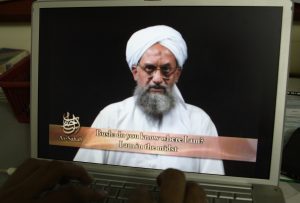Al-Qaida leader Ayman al-Zawahiri was killed in a U.S. drone strike on the morning of July 31 in Kabul. His elimination is the biggest blow to the militant group since the group’s founder Osama bin Laden was killed in 2011 in Pakistan’s military garrison town of Abbottabad.
As expected, Islamabad has not accepted a Pakistani role in the drone strike. However, its Foreign Office issued a carefully worded and relatively ambiguous statement on Tuesday. “Pakistan stands by countering terrorism in accordance with international law and relevant UN resolutions,” it said, without mentioning Pakistan’s role in the strike. “We have seen the official statements by the United States and media reports regarding a counter-terrorism operation carried out by the U.S. in Afghanistan,” the foreign office spokesperson, without mentioning Zawahiri’s name.
Implicitly approving Washington’s action, it said that Pakistan “condemns terrorism in all its forms and manifestations,” adding that the country’s “role and sacrifices in the fight against terrorism are well-known.”
However, this official position doesn’t necessarily mean that Islamabad had no role in the development. Pakistan’s civil and military leadership are known for denying their role in such attacks in the country’s tribal areas or in Afghanistan while covertly partnering with the U.S. to carry these out. For instance, In August 2008, then Prime Minister Yousuf Raza Gilani reportedly said: “I don’t care if they [CIA] do it as long as they get the right people. We’ll protest in the National Assembly and then ignore it.”
There are several reasons to believe that the raid which killed Zawahiri could not have happened without Pakistan’s assistance. It is quite possible that Pakistan-U.S. cooperation in counterterrorism operations in the region is back on track.
It is important to note that Zawahiri was killed days after Pakistan Army Chief Qamar Javed Bajwa called on the U.S. for help in negotiating a deal with the International Monetary Fund (IMF). Only a few weeks ago, Inter-Services Intelligence (ISI) Chief Lieutenant General Nadeem Anjum was in the U.S. to discuss security issues.
Pakistan’s generals would have happily obliged the U.S. if they were asked to cooperate in the operation.
Pakistan’s military has been working hard to revive its partnership with the U.S. which could also translate into much-needed financial assistance directly from the U.S. or global institutions under its influence, including the IMF. Some analysts believe that the development has the potential to revive Pakistan and the U.S.’ troubled relationship.
“When the US took out Bin Laden, relations with Pakistan sunk to a new low. With the US taking out Zawahiri and quite possibly with Pakistani assistance, relations with Pakistan may receive one of their biggest boosts in years,” Michael Kugelman, who is the Deputy Director of the Asia Program at the Wilson Center said in a Twitter post.
A Reuters report says that “the use of CIA drones to hit Zawahiri points to a secret overflight agreement with a neighboring country something the U.S. military does not have.” Most likely, the drone flew over Pakistan’s airspace before it entered Afghanistan to carry out the strike in Kabul. It is pertinent to note that under a 2003 agreement between Pakistan and the U.S., Washington has access to an air corridor for flights to and from Afghanistan. With Pakistan desperately wanting to repair ties with the U.S., it is entirely possible that Islamabad went a step further and shared intelligence as well.
Meanwhile, the Election Commission of Pakistan (ECP) has ruled that former Prime Minister Imran Khan’s Pakistan Tehreek-e-Insaaf had received illegal funding from abroad. The verdict’s timings may be linked to Sunday’s drone strike.
For weeks, the Pakistan military was working to build leverage against Khan, who has been on a rampage, targeting the military for its alleged covert support to the U.S. drone operations in Pakistan’s tribal areas in the past.
A government official told The Diplomat on condition of anonymity that “the timing of the verdict is indeed striking,” The ECP verdict, the official said, “can potentially lead to Imran Khan being banned from holding public office for life but he could also get away with it if he stopped undermining Pakistan’s efforts to restore ties with the U.S.”
So far, Khan has not said a word about the drone strike that killed Zawahiri. Moreover, PTI’s social media teams have also been quiet about the development.
Had it not been for the ECP verdict, Khan and his followers would have been busy in churning out all sorts of conspiracy theories about the alleged military’s cooperation with the U.S. to take out Zawahiri.
In immediate terms, Pakistan appears to have successfully managed domestically the fallout of the drone strike and with it, the country may have pulled out something which could help ease its financial and diplomatic woes in the coming months.

































